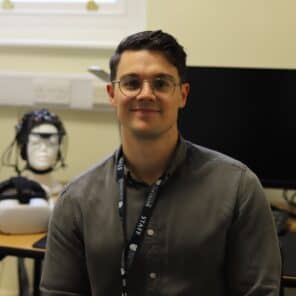99%
positivity for how well resources and facilities support learning
National Student Survey 2024
92%
positivity for overall teaching on my course
National Student Survey 2024
95%
positivity for overall academic support
National Student Survey 2024
Join us at one of our Open Days!
Saturday 11 October
Sunday 26 October
Saturday 22 November
Saturday 11 October
Sunday 26 October
Saturday 22 November
Our next Open Day is in:
Overview
Explore the psychological and social factors that lead people to commit crimes
Our BSc (Hons) Criminology degree explores the scientific study of crimes and why people commit them, the justice system, and the duty of care we have to those who have engaged in deviant behaviour.
Study innovative and ground-breaking criminology topics
Using the latest research and practice, you will explore the psychological and social factors behind deviant behaviour in relation to variety of crimes, as well as the judicial consequences and processes that come with them.
Understand the law and the criminal justice system
Throughout your degree you will gain an in-depth knowledge of the operations of the criminal justice, and learn more about criminal law and its applications within the judiciary system.
Examine the impacts of crime
You will consider the impact of crime upon individuals, communities and wider society, as you use the latest research to examine how crime can be prevented and the rehabilitation of offenders.
Use scientific data to predict criminal behaviour
During the course, you will receive scientific and statistics training to develop critical and analytical skills, as you learn how to handle data that you can use to predict criminal behaviour.
Discover a range of topics that include:
- Criminal law
- Cyber-crime and security
- Mental health and forensic psychology
- Penology
- Policing and police investigation
- Terrorism
- Young people and crime.
Learn from expert active researchers and ex-police staff
Our team of active researchers and experienced experts bring their knowledge and research directly into the classroom to ensure that you engage with the latest innovations and theories.
Small teaching groups for more personalised support
Our small, interactive seminars mean you are seen as an individual, not just another face in the crowd, as our lecturers get to know you and how best to support your academic and personal development.
Gain vital professional insights on future careers
Our dedicated ‘Criminology in Professional Practice’ module in your third year allows you to hear directly from working professionals about the career opportunities relevant to a criminology degree.
On this course you will:
- Examine the psychological and social causes of crime and its consequences.
- Understand the role of the law and the inner workings of the criminal justice system.
- Gain key scientific skills in data handling and analysis as you learn to predict criminal behaviour.
- Learn from ex-police staff and expert researchers who really get to know you and your needs.
- Hear about your future career options from professionals working within criminology-related fields.
The Course
Gain an in-depth understanding of crime, criminals and the systems that deal with them
Year One
Your first year will introduce you to the foundations of criminological study, as you gain insights into the key issues and debates, consider how society manages crime and criminals, and explore the broad concepts that underpin human rights, diversity and duty of care.
In addition, you’ll begin to gain the scientific and statistical skills required to conduct research in criminology.
Year Two
In your second year, you will examine more specialist topics as you broaden your understanding of aspects including criminal law, mental health and forensic psychology, cybercrime and security, and classic criminology case studies.
In addition, you will further your knowledge and skills in statistical data management, as well as the design and implementation of research experiments.
Year Three
In your final year, you will work to apply your acquired subject knowledge and research skills ahead of a final year project on a topic of your choice, as you also investigate young people and crime, and wider international law.
Criminology in Professional Practice module
Our careers-focused module in your third year introduces you to the real-world practice in criminology, and gives you an idea of where you could apply your skills as you explore jobs relating to criminology degrees.
Indicative modules
You will study a selection of core and optional modules in each year. Each module is worth a number of credits and is delivered differently depending on its content and focus of study.
Modules
Select a year
Social Minds: Exploring Human Interaction
The module will explore the experience of relationships through the processes related to forming an impression of people, feeling attracted or not to them, wanting to be their friend, getting to know them and forming a relationship with them, through a variety of behaviours, such as approaching them, talking to them, and meeting them socially.
Psychological theories and empirical findings from investigations into impression formation will be introduced, and methodology will be explored.
Thinking Like a Social Scientist: Study and Research Skills
This module will introduce you to research skills that are essential for your academic success and growth. It introduces you to the basics of data analysis and covers key concepts in time management and teamwork. You’ll develop your critical thinking skills to enhance your ability to present convincing arguments in written work, and your academic reading skills will also develop to enable you to access complex scientific reports.
Additionally, the module will teach you how to produce high-quality assessments, including creating references and citations using APA style, presenting information effectively, and writing well-structured essays.
Criminal Law I
This module introduces you to the different aspects of criminal law, which examines the theory underpinning criminal law and the elements of criminal liability, as well as providing an understanding of a range of criminal offences and the ability to analyse and evaluate related case law.
You will also continue to develop legal reasoning, research and referencing skills.
Facilitating Wellbeing: Positive Perspectives
Based on the discipline of Positive Psychology, the module will explore the experience of living well, relating the need to understand well-being, emotions, motivation, aspirations and goals to self-development, personality traits, needs for achievement, self-efficacy, and self-esteem, environmental influences and the enhancement of well-being.
Psychological theories and empirical findings from investigations into needs, motivation and traits will be introduced, as will the use of selected nonparametric statistics.
This module aims to give you an understanding of a broad area of everyday functioning and experience in terms of the behaviours, feelings, attitudes, and mental processes involved in that experience.
The module also aims to use functional analysis so that a broad experience can be broken down into a series of questions concerning the sub-functions and behaviours involved, allowing the psychological constructs and theories that are associated with those behaviours to be elucidated and explored. Exploration will involve appropriate methods to investigate what psychological constructs and theories relate to relevant behaviours and function.
The module will explore the experience of positive psychology relating the need to understand one’s own motivation, aspirations, and goals to self-development, personality, need for achievement, self-efficacy and self-esteem.
Psychological theories and empirical findings from investigations into emotions, traits and environments will be introduced and non-parametric methodology will be explored.
Mind and Machine
The module aims to develop an understanding of a broad area of everyday functioning and experience in terms of the behaviours, feelings, attitudes and mental processes involved in that experience.
You will use functional analysis so that a broad experience can be broken down into a series of questions concerning the sub-functions, psychological states and behaviours involved, allowing the psychological constructs and theories that are associated with those states and behaviours to be elucidated and explored.
Exploration will involve appropriate methods to investigate what psychological constructs and theories relate to relevant behaviours and function.
Crime and Society: Justice and Reform
In this module, you will explore theories surrounding crime and its conceptual construction.
Alongside this, a consideration of the role and function of law in society will be made. You will undertake an introduction to criminal profiling, an exploration of what leads people to commit crime and will consider the relevance of class, culture, age, and gender.
Historical links to criminal behaviour, mental health, and sexuality will also be explored.
Cybercrime and Security
The module will introduce key issues related to cybercrime and cybersecurity. Some key areas that will be covered include stealing ideas in the digital domain, use of bots in cybercrime, digital evidence and themes and models of cybersecurity. Other issues, such as cyberbullying, trolling and hate speech, will also be explored.
Criminal Evidence
OptionalThis module will introduce the legal, procedural, and evidential rules relating to criminal evidence from arrest to court. You will study a fictional case study to examine the different types of evidence, the admissibility of evidence, the use of evidence in court, and its probative value.
You will continue to develop legal reasoning, research and referencing skills.
Research Methods: Experimental Design and Analysis
The module aims to develop an understanding of experimental designs and associated methods of analysis related to psychology, and introduces you to research ethics. The introduced methods are variants of Analysis of Variance (ANOVA), a method that allows comparison of groups and/or conditions.
Criminology Classics and Controversies
This module provides a comprehensive and critical knowledge of classic and contemporary criminological cases and the role of criminology in today’s understanding of different forms of crime. You will have the opportunity to compare and contrast as well as note the similarities in profiles of criminological cases.
Legal and Forensic Psychology
In this module, you will have the opportunity to explore a comprehensive range of key constructs, theories, and research in mental health and forensic psychology.
We will examine the numerous ways that psychological research, methods, and expertise are applied to both the study of psychopathology and to issues that come before the legal system.
Different types of criminal law will be discussed, and case studies will be used to consider how these might be dealt with.
Research Methods: Survey & Qualitative Designs and Analysis
The module aims to develop an understanding of survey and qualitative designs and associated methods of analysis related to psychology.
The module will develop knowledge of survey and qualitative approaches to investigating and analysing psychological data. The relationship between correlational analysis and predictive reasoning will be outlined. Areas covered include multivariate analysis (multiple regression) and thematic analysis.
Independent Project
The Independent Project provides an opportunity to apply appropriate knowledge, concepts, techniques and research methods of psychology to an in-depth study of a particular question or problem related to psychology.
This module aims to foster a greater understanding of the processes involved in undertaking a research project and marks the culmination of your learning experience.
The study will enable you to produce a written research report, and a poster presenting a summary of your research and findings.
Project Management and Presentation Skills
This module enables you to deliver a wide range of skills, from project management to presentation of results in an accessible form.
In this module, you will have the opportunity to develop your project management skills, to further develop your scientific reasoning and reporting skills, and to learn skills necessary for producing a poster presenting research work.
Cyberlaw
The aim of this module is for you to develop an understanding of a range of contemporary legal and regulatory issues relating to the internet, internet-related technologies, the web and various online ecosystems.
The module will consider discrete thematic, contemporary topics, all connected to the online cyber sphere. Some of the topics are regulatory, others concern civil law, and some involve criminal offences.
It is a highly topical module and ever-changing, as human engagement with these online ecosystems is in a constant state of flux and development.
The module will examine domestic, comparative and international legal and regulatory responses, offering a contextual, critical perspective on the subject matter.
Professional Skills in Clinical Settings
Professional Skills in Clinical Settings aims to put theory into practice. This module aims to introduce and explore important aspects in clinical settings and the role of the therapeutic relationship.
Interviewing skills in clinical settings will be explored in relation to the strengths and weaknesses of structured and semi-structured interview methods. You will gain experience of participating in a recorded interviewing session in the role of interviewer.
In this module, you will participate in a supervised administration of a standardised intelligence test that will give experience of and insight into psychological assessment typically conducted by child psychologists, educational psychologists, clinical psychologists and occupational psychologists.
Criminology in Professional Practice
This module aims to introduce you to the practice of ‘real-life’ criminology. It will equip you with an idea of where you could apply the skills learned in this degree. This module will aim to introduce you to the professional areas of practice that your degree might take you into.
Young People and Crime
To establish a firm understanding of crime in relation to young people, the crimes that they commit, profiling and crimes that are committed against them.
This module aims to give you an understanding of the role of the youth justice system and explore what efforts are made to reduce recidivism and promote restorative justice.
Teaching and Assessment
Feel the support of our expert and experienced staff
Smaller class sizes for better learning
You will build your subject knowledge and practical experience through lectures, workshops, and tutorials in small classes, which means our expert teaching staff really get to know you and what support you need.
Learn more about our teaching staff
Stephanie Jane Bennett
Stephanie is a Chartered Psychologist and Associate Fellow of the British Psychological Society as well as a Fellow of the Higher Education Academy.
As well as a BSc, MSc and PhD in Psychology, she also has a MSc Degree in Crime Science Investigation and Intelligence. Stephanie has experience of working for the NHS, NGOs as well as extensive experience of teaching and researching across both Criminology and Psychology.
Moitree Banerjee
Moitree is the Head of Psychology and Criminology Programme in the Institute of Psychology, Business and Human Sciences. She is a Reader in Clinical Psychology.
Benjamin T. Sharpe
Benjamin is a lecturer and a researcher in cognitive psychology at the Institute of Psychology, Business, and Human Sciences of the University of Chichester. Ben is currently a member of the Universities Academic Board and the Research and Innovation Committee, and staff CPD coordinator and technology officer within his institute.
James Stiller
James has taught, developed, and led on a range of undergraduate and postgraduate psychology modules and courses.
James has a diverse range of research interests, including:
- Social network analysis and the evolution of social groups
- The connection between engaging with nature and wellbeing
- Visual perception
- Reading and maths comprehension in children
- Bullying behaviour in schools
Roy Spina
Roy completed his BSc in Psychology at University of British Columbia, before undertaking his MSc and PhD in Social and Personality psychology at Queen’s University (Canada), acquiring a strong background in research methodology and statistics, with an emphasis on quantitative experimental research.
In addition to being Academic Advisor and Research Degrees Co-ordinator, Dr Spina is the Research Lead for the department.
Rachel King
Rachel leads several second-year modules in the Department, in addition to supervising extended project qualification and BSc dissertation projects.
Currently, Rachel is interested in the functional impact of prospective memory deficits and the potential of hyperthermic conditioning for slowing the progression of cognitive decline in Alzheimer’s disease.
She is also a graduate member of the British Psychological Society.
Michelle Cleveland
Michelle is a Senior Lecturer in Psychology at the Institute of Education, Social and Life Sciences.
Michelle has taught, developed, and led on a range of undergraduate modules and courses, including Organisational Psychology, Qualitative Research Methods, Social Psychology, and Applied Psychological Skills.
She is a Chartered Psychologist, a Chartered Scientist, an Associate Fellow of the British Psychological Society as well as a Fellow of the Higher Education Academy.
Contact Time
Each module has three hours of contact time per week and includes lectures, seminars and workshops.
Assessments
You will be assessed through a range of assignments, including:
- Scientific reports
- Essays
- Group and individual presentations
- Poster design
- Multiple choice papers
- Short answer papers
- Research participation
- Case studies.
Experience
Discover our range of specialist research equipment and facilities
Brain Imaging Unit and Neuroimaging: NIRScout
Our neuroimaging system with a 3D scalable ultra-high-density near-infrared spectroscopy platform measures changes in the cerebral cortex using NIRScout and NIRx Medical Technologies.
Eye tracking software
Our specialist eye tracking software allows you to track shifts in visual attention and can be used for attentional retraining purposes.
Specialist Advanced Research Software
Software for measuring and manipulating a broad range of psychological constructs; Inquisit, Qualtrics, Noldus Observer XT, E-prime, Superlab and Nvivo.
Advanced Physiological Data Acquisition system
Our specialist advanced data acquisition system allows you to measure physiological activity from the brain, heart and motor neuron pathways with Biopac software.
Learning Resource Centre
The Learning Resource Centre (LRC) contains the library, a café, IT/teaching rooms and the Support and Information Zone (SIZ).
Library
Our campus library holds more than 200,000 books and over 500,000 eBooks.
Kasia
Integrated Foundation Year Option
Build your academic confidence and skills with an initial foundation year
We also offer our BSc (Hons) Criminology with Integrated Foundation Year course.
This four-year course includes an integrated, introductory foundation year that develops your academic skills and confidence, and provides you with an overview of core topics that you will build upon in your further years of study.
Study Abroad
Explore the opportunity to study part of your course abroad
As a student at the University of Chichester, you can explore opportunities to study abroad during your studies to enrich your educational experience.
It’s a chance to broaden your horizons, a great opportunity to meet new people, undertake further travelling and to immerse yourself within a new culture.
You will be fully supported throughout the process to help find the right destination and institution for you and your course. We can take you through everything that you will need to consider, from visas to financial support, to ensure you get the best out of your time studying abroad.
Careers
Where you could go after your studies
Our BSc (Hons) Criminology degree provides a strong foundation for a wide variety of careers in particular areas, including the police, prison service, youth justice or the probation service.
Careers routes after this degree include:
- Policing
- Justice or legal systems
- Probation service
- Home Office or civil service
- Social welfare
- HM Revenue and Customs
- Data analysis
- Market, government or social research.
Further Study
You may decide to continue your studies at the University of Chichester and undertake a postgraduate degree. Our postgraduate courses offer you the opportunity to deepen your knowledge and greatly improve your career prospects. Postgraduate study options available at Chichester include Masters, PGCE and PhD.
Course Costs
Course Fees 2025/26
UK fee
International fee
EU/EEA Fee Reduction Scholarship
EU/EEA students automatically pay the equivalent of UK fees via the EU/EEA Fee Reduction Scholarship
For further details about fees, please see our Tuition Fee page.
For further details about international scholarships, please see our Scholarships page.
To find out about any additional costs on this course, please see our Additional Costs page.
Entry Requirements
Typical offers (individual offers may vary):
UCAS
A Levels
BTEC/Cambridge Technical
Access to HE Diploma
IB
IELTS
Contextual offers
We believe everyone deserves an equal opportunity to pursue higher education, regardless of their background.
When we receive your application we consider your personal circumstances and the factors surrounding your achievements to see if you are eligible for a contextual offer. This is an offer with a reduced entry tariff – typically the equivalent of 16 fewer UCAS points (two A-level grades).
Find out more about our contextual offers.
Are you interested in this course and would like to learn more? Please email Professor Esther Burkitt on e.burkitt@chi.ac.uk for admissions queries.
Integrated Foundation Year
We offer an integrated foundation year with BSc (Hons) Criminology. This option is for you if you are interested in Criminology but do not meet the course entry requirements yet, or if you want more time to prepare for higher education.
Non-standard Application Entry Routes
The University has an alternative entry route for applicants who have relevant skills and experience but who do not hold the formal minimum entry qualifications required. Applicants who demonstrate the necessary skills and experience to enter a course of higher education will be asked to complete an entry task involving the completion of specially set assignments











